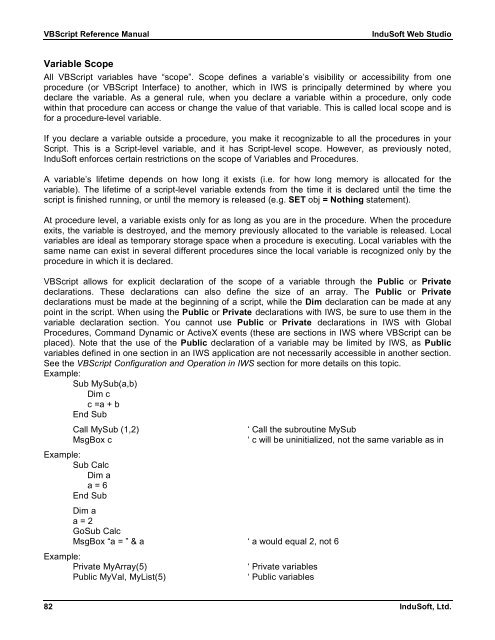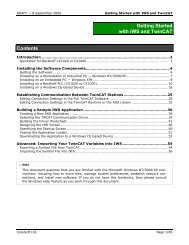VBScript Reference Manual for InduSoft Web Studio
VBScript Reference Manual for InduSoft Web Studio
VBScript Reference Manual for InduSoft Web Studio
Create successful ePaper yourself
Turn your PDF publications into a flip-book with our unique Google optimized e-Paper software.
<strong>VBScript</strong> <strong>Reference</strong> <strong>Manual</strong> <strong>InduSoft</strong> <strong>Web</strong> <strong>Studio</strong><br />
Variable Scope<br />
All <strong>VBScript</strong> variables have “scope”. Scope defines a variable’s visibility or accessibility from one<br />
procedure (or <strong>VBScript</strong> Interface) to another, which in IWS is principally determined by where you<br />
declare the variable. As a general rule, when you declare a variable within a procedure, only code<br />
within that procedure can access or change the value of that variable. This is called local scope and is<br />
<strong>for</strong> a procedure-level variable.<br />
If you declare a variable outside a procedure, you make it recognizable to all the procedures in your<br />
Script. This is a Script-level variable, and it has Script-level scope. However, as previously noted,<br />
<strong>InduSoft</strong> en<strong>for</strong>ces certain restrictions on the scope of Variables and Procedures.<br />
A variable’s lifetime depends on how long it exists (i.e. <strong>for</strong> how long memory is allocated <strong>for</strong> the<br />
variable). The lifetime of a script-level variable extends from the time it is declared until the time the<br />
script is finished running, or until the memory is released (e.g. SET obj = Nothing statement).<br />
At procedure level, a variable exists only <strong>for</strong> as long as you are in the procedure. When the procedure<br />
exits, the variable is destroyed, and the memory previously allocated to the variable is released. Local<br />
variables are ideal as temporary storage space when a procedure is executing. Local variables with the<br />
same name can exist in several different procedures since the local variable is recognized only by the<br />
procedure in which it is declared.<br />
<strong>VBScript</strong> allows <strong>for</strong> explicit declaration of the scope of a variable through the Public or Private<br />
declarations. These declarations can also define the size of an array. The Public or Private<br />
declarations must be made at the beginning of a script, while the Dim declaration can be made at any<br />
point in the script. When using the Public or Private declarations with IWS, be sure to use them in the<br />
variable declaration section. You cannot use Public or Private declarations in IWS with Global<br />
Procedures, Command Dynamic or ActiveX events (these are sections in IWS where <strong>VBScript</strong> can be<br />
placed). Note that the use of the Public declaration of a variable may be limited by IWS, as Public<br />
variables defined in one section in an IWS application are not necessarily accessible in another section.<br />
See the <strong>VBScript</strong> Configuration and Operation in IWS section <strong>for</strong> more details on this topic.<br />
Example:<br />
Sub MySub(a,b)<br />
Dim c<br />
c =a + b<br />
End Sub<br />
Call MySub (1,2) ‘ Call the subroutine MySub<br />
MsgBox c ‘ c will be uninitialized, not the same variable as in<br />
Example:<br />
Sub Calc<br />
Dim a<br />
a = 6<br />
End Sub<br />
Dim a<br />
a = 2<br />
GoSub Calc<br />
MsgBox “a = ” & a ‘ a would equal 2, not 6<br />
Example:<br />
Private MyArray(5) ‘ Private variables<br />
Public MyVal, MyList(5) ‘ Public variables<br />
82 <strong>InduSoft</strong>, Ltd.



